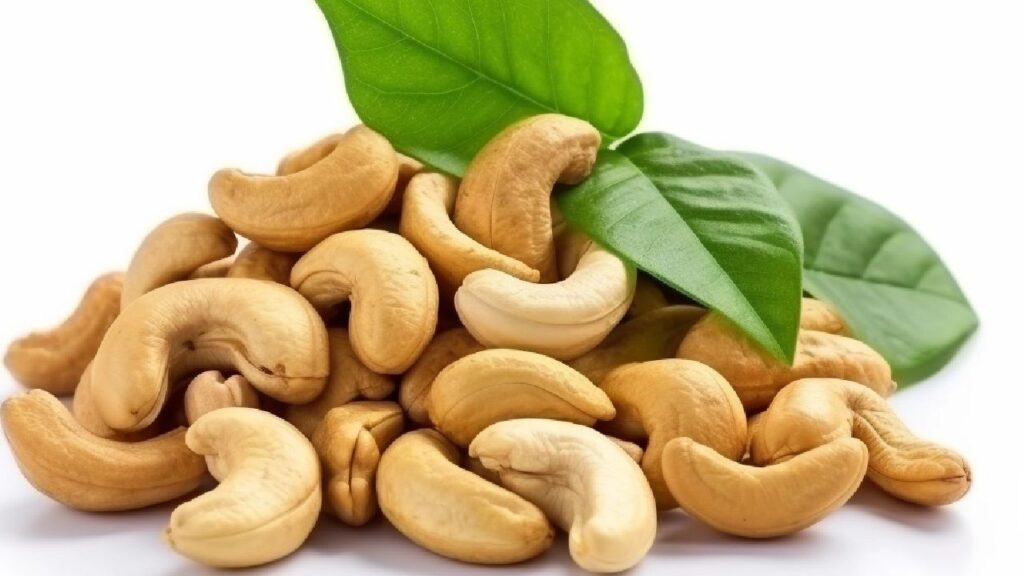When sharing our favorite snacks with our canine companions, knowing which foods are safe and which might pose a risk is essential. Cashews, those delicious kidney-shaped nuts, often find their way into our diets.
But can dogs eat cashews? Yes, dogs can eat cashews, but there are a few precautions to remember. This article further delves into this question to explore the potential benefits and concerns of sharing these nuts with our furry friends.
What are the Health Benefits of Cashews?
Cashews are more than just a tasty snack; they offer a range of health benefits for your canine companion. These benefits stem from the essential nutrients found within these kidney-shaped nuts. Here’s a closer look at how cashews can positively impact your dog’s well-being:
- Protein Powerhouse: Cashews are a good source of plant-based protein. Protein is essential for muscle maintenance, repair, and overall growth. Introducing moderate cashews into your dog’s diet can increase their protein intake.
- Healthy Fats: Cashews are rich in healthy fats, including monounsaturated and polyunsaturated fats. These fats are crucial for maintaining a shiny coat and healthy skin. They also support your dog’s cardiovascular health and brain function.
- Vitamins Galore: Cashews contain various vital vitamins in your dog’s health. For instance, vitamin E is an antioxidant, protecting cells from damage. B vitamins aid in energy production and support the nervous system.
- Energy Source: The healthy fats and carbohydrates in cashews provide a quick energy boost. This can especially benefit active dogs or those engaged in physical activities.
Are Cashews Bad for Dogs?
While cashews have their share of health benefits, it’s essential to approach them cautiously, as they might not be suitable for every dog. Here’s a closer look at potential concerns and reasons why cashews might not always be the best choice for your canine companion:
- High-Fat Content: Cashews are relatively high in fat, which can be problematic if consumed excessively. Dogs that consume too many high-fat foods can develop obesity, pancreatitis, and gastrointestinal upset.
- Caloric Density: Due to their high-calorie content, cashews can contribute to weight gain without moderation. Obesity in dogs can lead to various health problems, including joint issues and heart conditions.
- Sodium Levels: Many commercially available cashews are salted, and excessive sodium intake can lead to hypertension and other cardiovascular issues in dogs. Salted cashews are a definite no-no for your furry friend.
- Digestive Sensitivity: Some dogs have sensitive stomachs, and introducing new foods like cashews can lead to digestive disturbances such as diarrhea, vomiting, or gas.
- Allergies: Just like humans, dogs can have allergies to certain foods. While cashews aren’t a common allergen, it’s still possible for a dog to have an adverse reaction.

If cashews become a significant part of your dog’s diet without adequately considering their nutritional needs, it could lead to imbalances and deficiencies.
How to Safely Feed Your Dog Cashews?
If you’re thinking of sharing a few cashews with your canine friend, it’s crucial to do so safely and carefully. While cashews can offer certain benefits, responsible pet ownership requires meticulous consideration to ensure your dog’s health and well-being. Here’s a detailed guide on how to incorporate cashews into your dog’s diet while minimizing potential risks:
- Unsalted and Unseasoned Choices: When selecting cashews for your dog, prioritize plain, unsalted, and unseasoned varieties. This avoids unnecessary sodium intake, which can lead to health complications. Some seasoned or flavored cashews might contain ingredients that are harmful to dogs, such as onion or garlic.
- Proper Preparation: Before offering cashews to your dog, take the time to prepare them appropriately. Ensure the cashews are free from any shells, as the hard shells can pose a choking hazard or digestive discomfort. Removing the shells also prevents your dog from ingesting any potential toxins present in the shells.
- Size Matters: Chopping the cashews into small, manageable pieces is essential. Larger pieces can present a choking risk, especially for smaller breeds. By providing appropriately sized portions, you minimize the likelihood of choking incidents.
- Start Small: Like any new food, start by introducing a small amount of cashews into your dog’s diet. This initial portion will allow you to observe your dog’s reaction and any potential sensitivities. If your dog has never eaten cashews, a few small pieces are sufficient for the first time.
- Monitor Closely: After giving your dog a small portion of cashews, keep a close eye on them for the next few hours. Watch for any signs of allergic reactions, digestive upset, or unusual behavior. If you notice any adverse reactions, such as vomiting, diarrhea, or changes in behavior, discontinue the cashews immediately and consult your veterinarian.
- Consider Your Dog’s Health Status: It’s essential to consider your dog’s overall health before introducing new foods. If your dog has underlying health conditions, is on specific medications, or has a history of allergies, consult your veterinarian before adding cashews to their diet.

Conclusion
Cashews can be a wholesome dog treat when approached cautiously. Their nutrient-rich profile can offer various health benefits, but it’s important to remember that moderation is vital.
Always prioritize your dog’s safety by choosing plain cashews and introducing them gradually. Consult your veterinarian promptly if you have concerns or notice any adverse reactions. You can share the occasional cashew snack and delight your furry companion with the right approach.

FAQs
Can all dogs eat cashews?
While most dogs can tolerate cashews in moderation, individual sensitivities vary. It’s best to consult your vet before introducing cashews to your dog’s diet.
How many cashews can I give my dog?
Portion control is crucial. Depending on your dog’s size, 1-2 cashews a few times a week can be a general guideline, but consult your vet for personalized advice.
Are other nuts like almonds or walnuts safe for dogs?
Not all nuts are safe for dogs. Almonds and walnuts can be problematic due to their shape and potential toxin content. Sticking to nuts like unsalted peanuts and cashews in moderation is safer.
Can puppies eat cashews?
Puppies have delicate digestive systems. It’s better to wait until they’re older and consult your vet before introducing new foods.
Can I give cashew butter to my dog instead of whole cashews?
Cashew butter can be a convenient alternative to whole cashews. However, it’s essential to ensure that the cashew butter is free from additives like salt, sugar, and artificial flavors.






cashews are a staple snack in our home but never thought about sharing them with our shih tzu